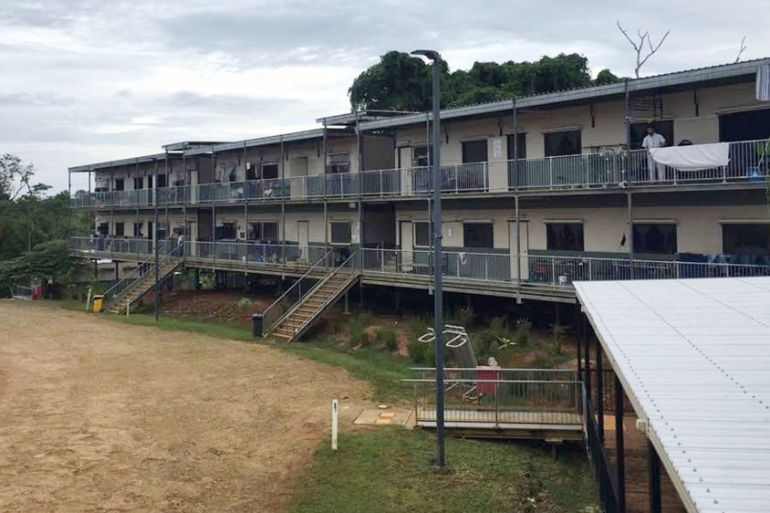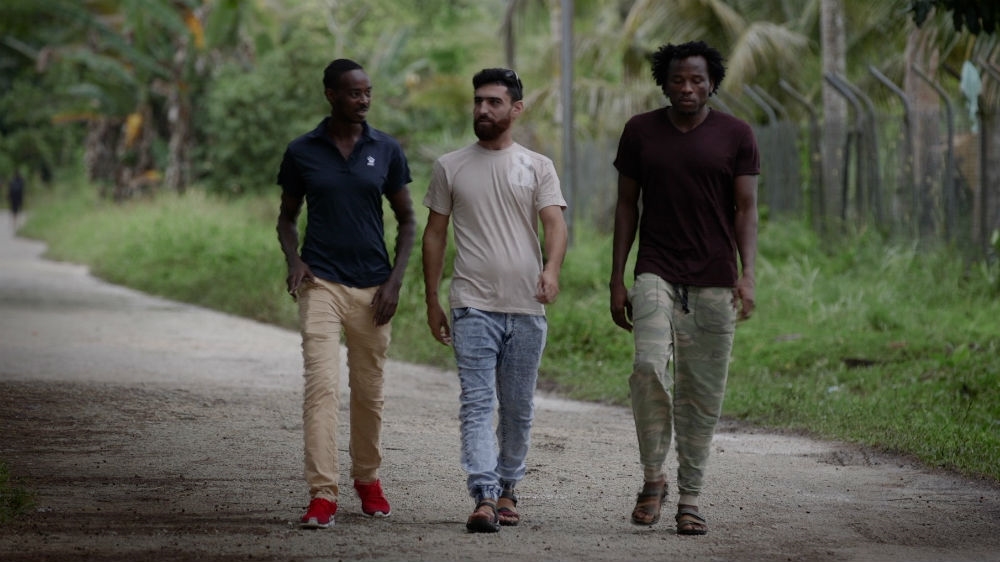Refugee suicide attempts up on Manus after Australia election
Ten men have tried killing themselves since Australia’s conservative government returned to power, refugees say.

Melbourne, Australia – Refugees on Papua New Guinea‘s (PNG) Manus Island say there is increasing desperation on the Pacific island and at least 10 people have attempted suicide or committed self-harm following the re-election of Australia’s conservative government at the weekend.
For years, the Australian government has been sending asylum seekers who attempt to reach the country by sea to the remote islands of Manus and Nauru where they are held indefinitely with no chance of being resettled in Australia.
Keep reading
list of 4 items‘Mama we’re dying’: Only able to hear her kids in Gaza in their final days
Europe pledges to boost aid to Sudan on unwelcome war anniversary
Birth, death, escape: Three women’s struggle through Sudan’s war
Many of the roughly 900 people now on the islands live in squalid conditions and were hoping for a change in government to the left-leaning Australian Labor Party and a softening in Canberra’s hard line on asylum seekers.
But in a surprise result, Prime Minister Scott Morisson’s Liberal-National coalition on Saturday defied opinion polls to secure a victory over Labor.
Behrouz Boochani, an Iranian-Kurdish journalist who has been detained on Manus since 2013, told Al Jazeera that 10 men had attempted suicide or self-harm by various means, including cutting themselves with a razor, since then.
Several had been sent to a local medical centre, which he said is “not a real hospital, not a place with facilities”.
Two people receiving medical treatment in PNG’s capital, Port Moresby, who were due to be transferred back to Manus Island had attempted suicide prior to the election, he added.
Morrison stepped up the use of indefinite offshore detention in 2013, when he was immigration minister. A prime minister since August last year, he has vowed to undo recently-passed legislation – known as the Medevac Bill – that allowed people held on the remote Pacific islands to be brought to Australia for urgent medical treatment.
‘Big shock’
PNG remains one of the poorest nations in the Asia Pacific. Security is volatile, health facilities lack resources and local people have previously attacked refugees and asylum seekers.

“When we found out that the current government won the election, it was a big shock,” Shamindan, a refugee from Sri Lanka who is living on Manus, told Al Jazeera. Since Saturday, two or three people were attempting suicide or self-harm daily by “cutting themselves, overdosing with tablets, setting themselves on fire, and hanging themselves”, he said.
There have been 24 deaths in Australia’s onshore and offshore detention facilities since 2010, according to refugee groups, with 14 confirmed as suicides. More than half of the recorded deaths were people held on Manus and Nauru.
“We expected that if Labor got into power, they would accept New Zealand’s offer,” Boochani said. “The election was our big and last chance.”
New Zealand’s government has on several occasions offered to resettle 150 refugees from Manus and Nauru annually, an offer rejected by Canberra which claims it could provide a “backdoor” for refugees to get into Australia. New Zealand nationals are able to live and work in Australia without the need for visas.
Labor had pledged to revisit the proposal.
Asked about the suicide attempts, a spokesperson for Australia’s Department of Home Affairs said the welfare of the people on Manus was the responsibility of the PNG government.
“The Department of Home Affairs takes seriously its role in supporting the government of PNG to ensure refugees and failed asylum seekers are provided with a range of health, welfare and support services arrangements. This has not changed,” the spokesperson added.
Morrison has said his government will prioritise the repeal of the Medevac law.
“People were hoping that [a] Labor government would solve many problems [including] the problem of the sick people, facilitate the process with the United States, and accept the New Zealand offer so the men could be sent there out of that nightmare,” Sudanese refugee Abdul Aziz Muhamat, told Al Jazeera over the phone from Geneva where he recently travelled from Manus to receive an international human rights award.
“As someone who has been detained for six years … I have never seen people in that stage of mental health anguish,” Muhamat said.

‘Duty of care’
Under a deal signed in 2016 with the administration of former President Barack Obama, the US agreed to consider resettling refugees held on the islands, as well as those transferred back to Australia for medical reasons.
So far, the US has resettled several hundreds out of a promised 1,250 refugees, but President Donald Trump has called the deal “stupid”.
Australia’s Treasurer Josh Frydenberg reiterated this week that it was the government’s policy to reverse the Medevac legislation and prevent the Pacific refugees from being transferred to Australia.
But the opposition and the members of the crossbench in the upper house are likely to make it difficult for them to do so.
The policy of offshore detention and boat turn-backs cost Australia an estimated 9.6 billion Australian dollars ($6.6bn) between 2013 and 2016, according to the United Nations’ children agency and Save the Children. It has also brought condemnation from the UN and human rights groups.
“Australia still has a duty of care to these people,” Elaine Pearson, director of Human Rights Watch in Australia, told Al Jazeera. “[It] transferred these people there, and under these conditions, people have developed such serious and acute health conditions.”
Some 80 percent of the refugee population in offshore detention suffer from mental health conditions, and do not have proper access to psychological support, she added.
The Morrison government claims the law does not allow authorities to return people seeking asylum back to Manus or Nauru after receiving treatment in Australia. Legal experts and Labor’s shadow immigration minister say the law means no change to the existing system of return.
“We don’t want to go to Australia,” said Boochani, whose autobiographical account of his detention on Manus, No Friend but the Mountains, recently won a prestigious Australian literary prize.
“Only freedom [can help] these people because people have been separated from their families for six years. Nothing else makes them happy,” he said.